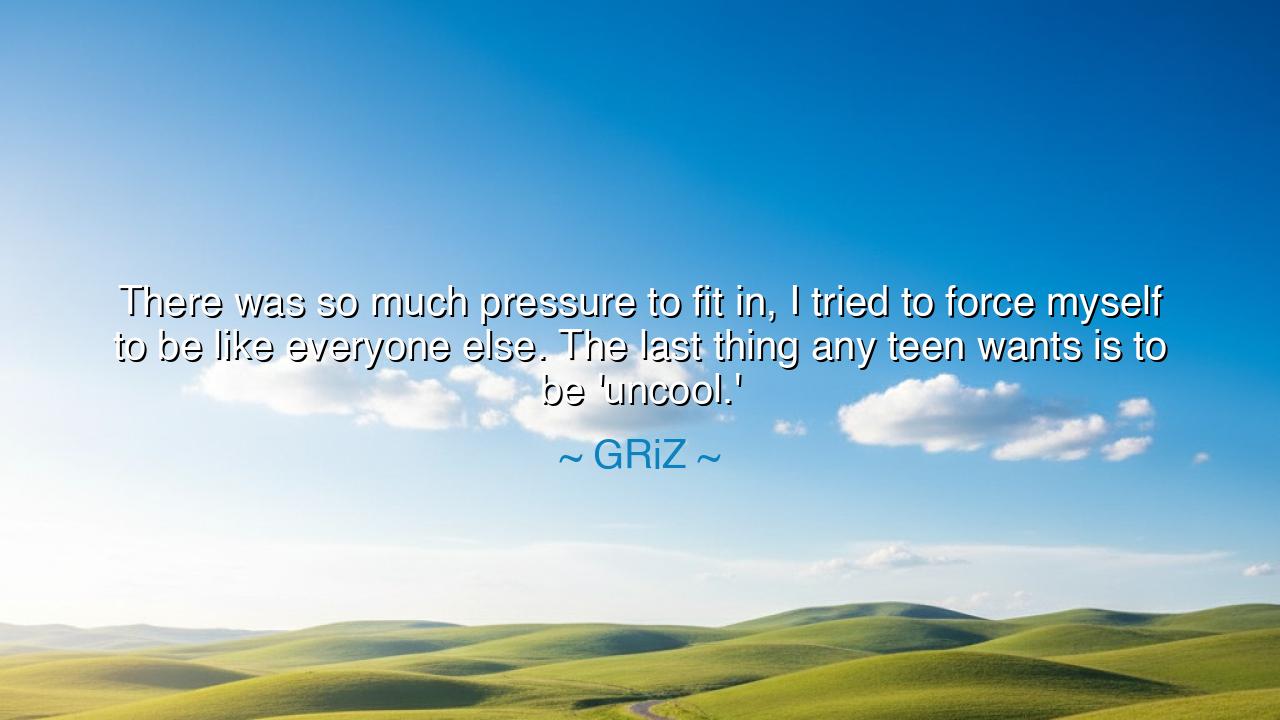
There was so much pressure to fit in, I tried to force myself to
There was so much pressure to fit in, I tried to force myself to be like everyone else. The last thing any teen wants is to be 'uncool.'






Hear now the words of GRiZ, the musician whose path was carved not only through melodies, but through the struggles of youth: “There was so much pressure to fit in, I tried to force myself to be like everyone else. The last thing any teen wants is to be ‘uncool.’” These words, though clothed in the language of modern times, carry the age-old battle of the soul: the struggle between the self that is true and the self that is shaped by the crowd. His confession is not weakness, but wisdom, for in revealing the chains he once bore, he shows us how one might break them.
In every generation, the young are surrounded by the invisible weight of expectation. The word pressure is not light—it is the hand of peers, the whisper of culture, the unspoken law that commands: “Be like us, or be cast out.” And so many, trembling at the thought of isolation, choose to hide their spark beneath a cloak of sameness. GRiZ, too, walked this path, forcing himself into the mold of others, lest he be branded the cursed word: uncool. But such a path, though it wins the approval of the crowd, leads the soul away from its own song.
Consider the tale of Socrates, who in ancient Athens faced mockery and trial because he did not conform. The people sneered, calling him strange, calling him a corrupter of youth, because he did not walk in lockstep with their customs. Yet his refusal to bend to the tyranny of “fitting in” gave birth to philosophies that have outlived empires. Had he sought to be cool in his day, we would not remember him now. His life is proof that the courage to stand apart is often the seed of greatness.
The fear of being uncool is, at its heart, the fear of rejection. For the teen, whose soul is still tender, this fear cuts deeper than sword or spear. Yet here lies the paradox: the very ones who stand firm in their difference become the leaders, the creators, the visionaries whom others later admire. The heroes of art, of science, of justice—they were mocked in their youth, out of step with the world around them. But in time, the world came to see that it was not they who were odd, but the crowd who were blind.
There is in GRiZ’s words a cry of liberation: he speaks as one who once bowed to pressure, yet found that it did not bring peace. For no man finds rest in the prison of imitation. True rest comes only when the soul accepts itself, when it dances to its own rhythm, even if no one else hears the music. To reject oneself for the sake of fitting in is to betray the gift the gods have placed within. Better to be mocked as uncool and walk in truth, than to be praised in falsehood and live as a shadow.
The lesson, therefore, is clear. Do not force yourself into another’s image, for in doing so, you lose the image that is yours alone. Instead, honor your difference. Let your uniqueness shine, even if it seems small or strange. Support others, too, in their strangeness—encourage the quiet voice, uplift the odd talent, cherish the unusual vision. For when a community learns to honor difference, it creates not conformity, but harmony.
And so, to all who hear these words: when the pressure comes—and it will—stand firm in your truth. When the crowd calls you uncool, smile, for you walk the path of the prophets, the thinkers, the artists who dared to live unbound. Take practical steps: seek friends who value your authenticity, practice small acts of courage daily by speaking your true thoughts, and remember stories like that of Socrates, or of GRiZ himself, who turned his youthful struggle into art. In this way, you will live not as a shadow of others, but as a light unto yourself and those who follow.
Thus, let GRiZ’s confession echo as a beacon: the chains of conformity may silence you, but the wings of authenticity will set you free.






AAdministratorAdministrator
Welcome, honored guests. Please leave a comment, we will respond soon